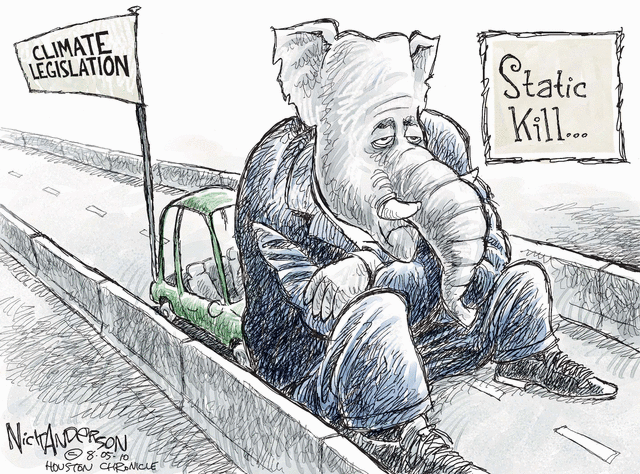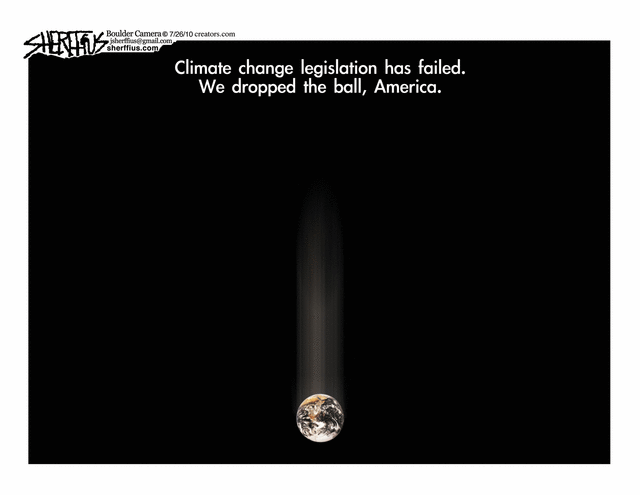We are governed by motherfucking idiots.
Or amoral greedheads, take your pick; but even the Nazi supporting Henry Ford understood you have to have someone to sell cars to.
Except we don’t sell cars anymore. What we sell is Ponzi scams, pyramid schemes, and multi-level marketing and all the shouters on CNBC think they got in at the top, but they’re really just bottom feeders like the rest of us.
Perhaps the coming Hindenberg Crash will convince them.
Or maybe they really are stupid.
Forget a Double Dip. We’re Still in One Long Big Dipper.
Robert Reich
Saturday, August 14, 2010
The central problem is lack of demand – and that’s what has to be tackled.
Three of the four sources of demand have stopped working. (1) Consumers can’t and won’t buy because they’re still under a huge debt load, can’t get more credit, are afraid of losing their jobs (or already have), depend on two wage earners at least one of whom is working part-time and pulling in less, or have to save. (2) Businesses won’t invest and spend on creating more jobs if they don’t see consumers willing to buy more. (3) Exports are stalled because the dollar is so high they cost too much, much of the rest of the world is still struggling with recession, and American firms can make things for sale abroad more cheaply abroad.
That leaves only one remaining source of demand – government. We need a giant jobs program to hire people and put money in their pockets that they’ll spend and thereby create more jobs. Put ideology aside and recognize this fact. If it makes you more comfortable call it the National Defense Jobs Act. Call it the WPA. Call it Chopped Liver. Whatever, we have to get the great army of the unemployed and underemployed working again.
…
If we let the deficit hawks and government haters dominate this debate, as they have, the Big Dipper will continue for years. The Great Depression lasted twelve.
Attacking Social Security
By PAUL KRUGMAN, The New York Times
Published: August 15, 2010
So where do claims of crisis come from? To a large extent they rely on bad-faith accounting. In particular, they rely on an exercise in three-card monte in which the surpluses Social Security has been running for a quarter-century don’t count – because hey, the program doesn’t have any independent existence; it’s just part of the general federal budget – while future Social Security deficits are unacceptable – because hey, the program has to stand on its own.
It would be easy to dismiss this bait-and-switch as obvious nonsense, except for one thing: many influential people – including Alan Simpson, co-chairman of the president’s deficit commission – are peddling this nonsense.
…
What’s really going on here? Conservatives hate Social Security for ideological reasons: its success undermines their claim that government is always the problem, never the solution. But they receive crucial support from Washington insiders, for whom a declared willingness to cut Social Security has long served as a badge of fiscal seriousness, never mind the arithmetic.
| From Yahoo News Business |
1 China overshadows Japan economy as growth slows
by David Watkins, AFP
52 mins ago
| TOKYO (AFP) – Japan’s economy was outpaced by China in the second quarter in nominal terms, data showed Monday, as sharply weaker than expected growth triggered fresh fears that the global recovery is losing steam.
As cooling exports and flat domestic consumption hit Japan’s growth in April-June, the data pointed to the looming prospect of China overtaking Japan as the world’s second-largest economy. “The economy is levelling off,” said Keisuke Tsumura, parliamentary secretary of the Cabinet Office. |



Recent Comments